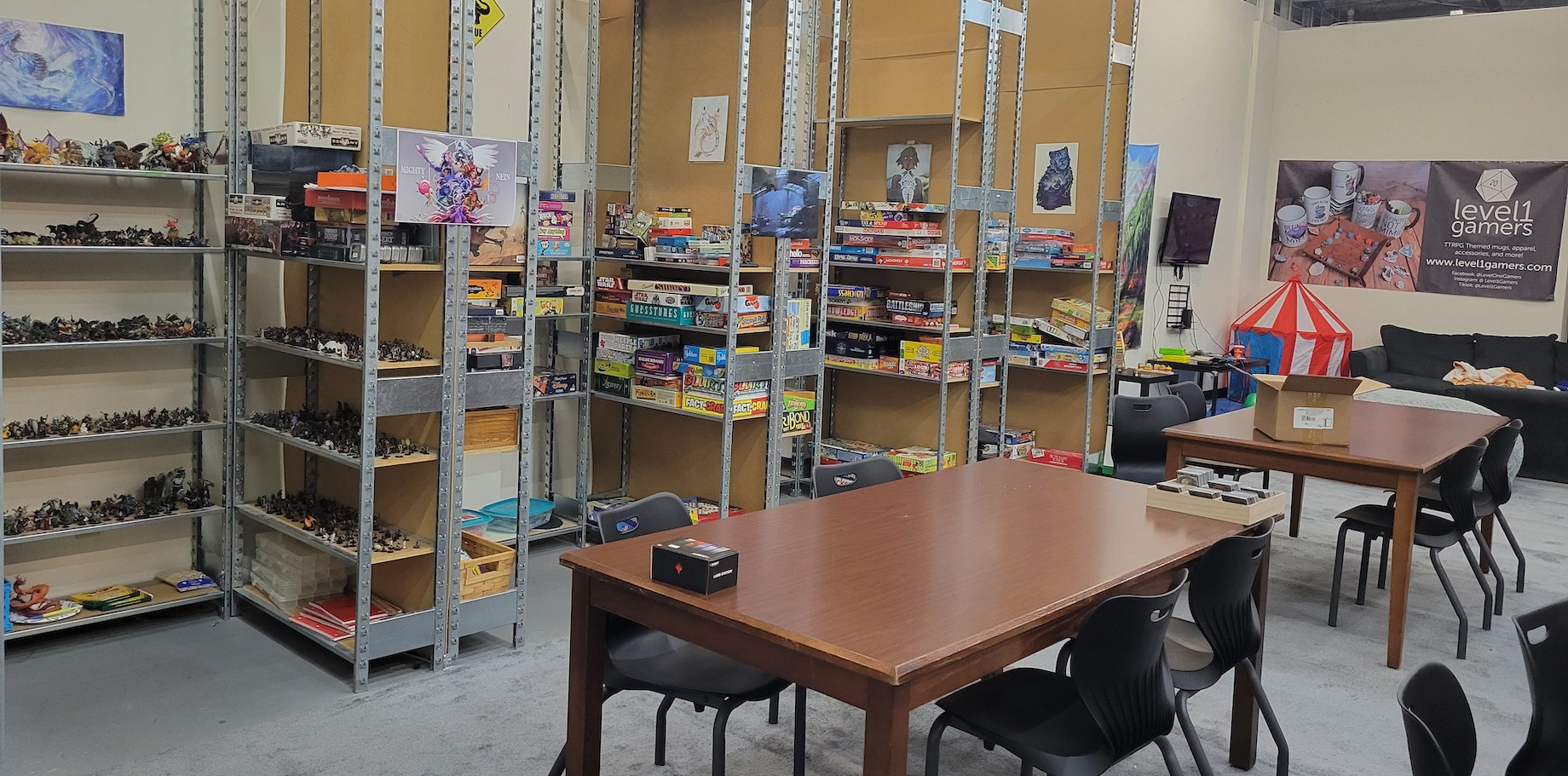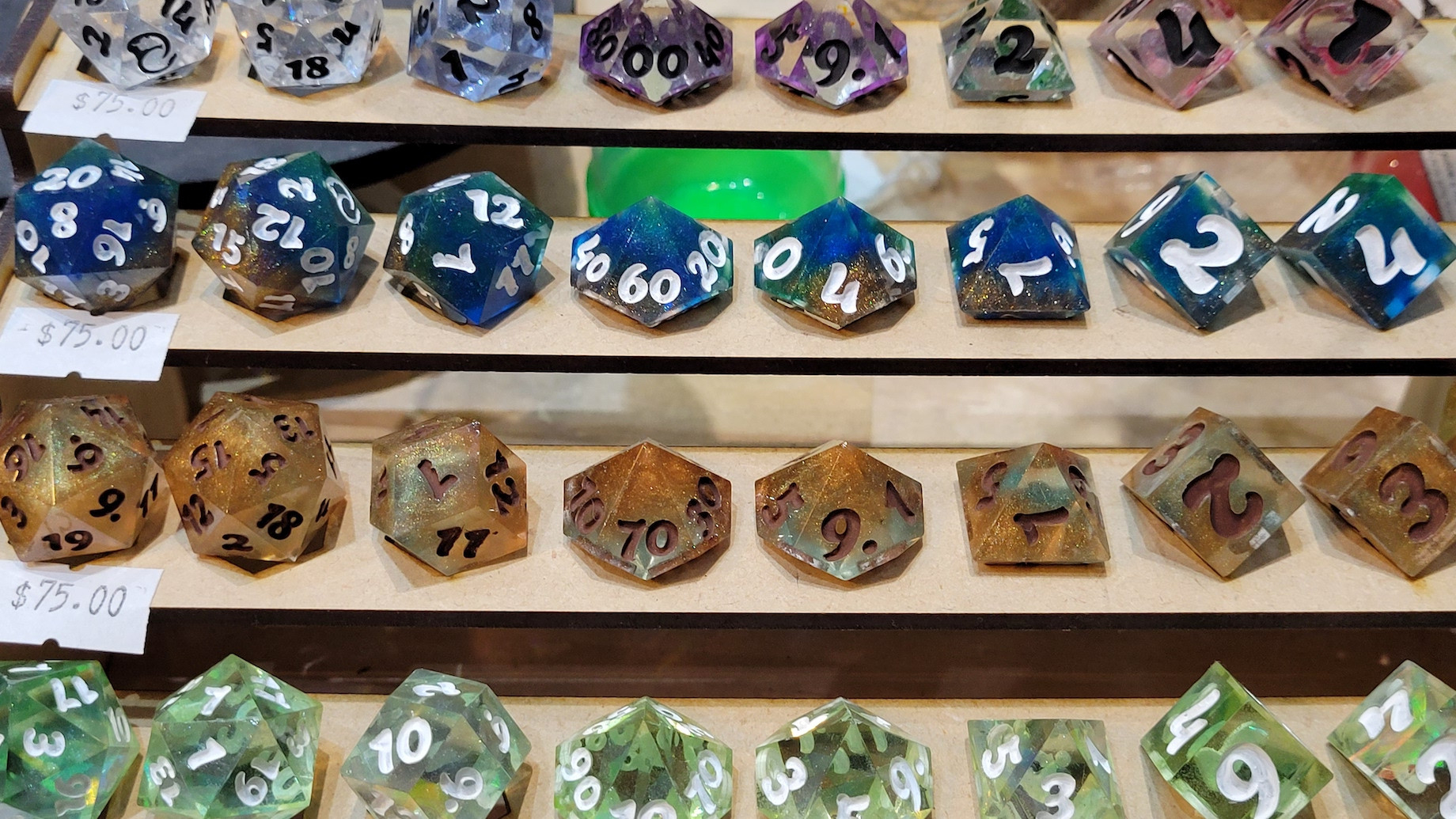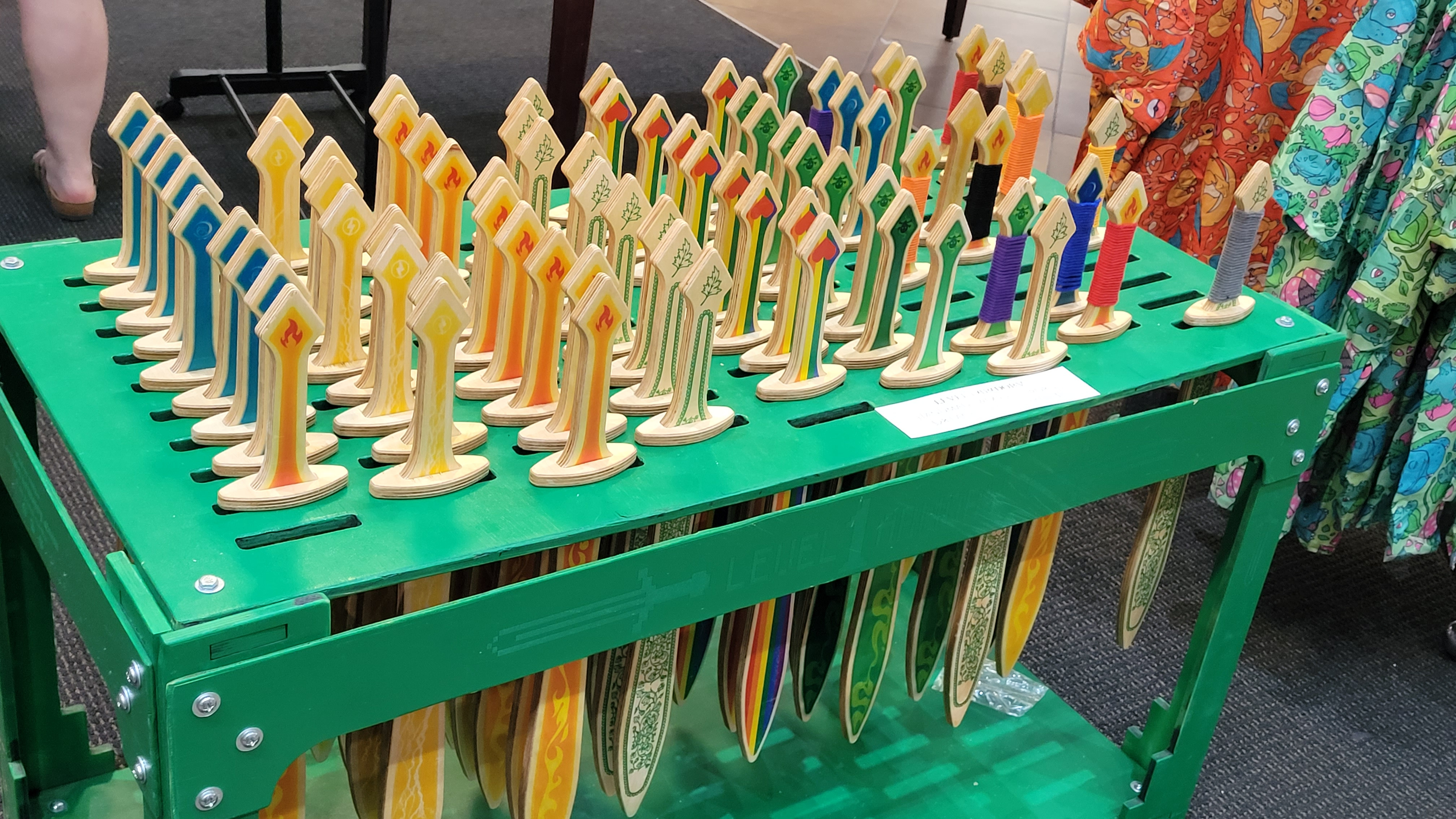Games are about shared experiences. Since the inception of gaming, players have gathered around their favorites and forged connections that transcend any sort of virtual realms. This strong community, in fact, is one reason Lisa and Paul Hall had the confidence to open Level 1 Gamers this spring. “When you support your community, they will support you,” Lisa said.
Lisa and Paul have long been enmeshed in the virtual and real-life gaming community. They love everything from Pokemon, which they play with their son, to tabletop games like Dungeons & Dragons and Magic: The Gathering. “Neither of us had awesome childhoods,” Lisa said. Games were where they felt safe and connected.
Paul, a graphic designer, and Lisa, a self-taught illustrator, met while working on a project for IHG Hotels & Resorts: designing a comic book to incentivize the hotel’s phone agents. “It was all about superheroes fighting to get revenue,” Lisa said. Paul added: “It was pretty cringe.” But it was the start of a lifelong collaboration. They got married in 2013 and later merged their interests in gaming and art to produce illustrated portraits of characters from popular movies and games. They sold those at Comic Cons around the country and made enough for Lisa to quit her day job.
In 2016, she learned she was pregnant. The two wanted their newborn’s clothes to “match our nerdy interest,” Lisa said, but they couldn’t find any clothes they liked. They realized there was a market for “geeky gamer clothes for babies,” as Lisa describes it. She cashed out her 401(k) and bought a T-shirt press, a vinyl cutter and everything else they needed to make onesies. “We called it Level 1 Gamers because we were making stuff for babies and Level 1 in gaming is the very first level,” Lisa said. As soon as they put the inventory online and started showing it at conventions, people asked if they had adult sizes, so the two expanded their collection to things like T-shirts, mugs, gaming accessories and dice.
For a while, the Level 1 Gamers online store thrived — it was one of the top searches for the “tabletop-themed merchandise” and “tabletop games” categories — but when scammers started stealing their designs and eating up their profits, they had to pivot again. Knowing how successful they’d been at in-person events, they moved to a brick-and-mortar model and brought in other gamer artists. Their physical store opened in May at The Shops at South Town in Sandy, Utah.
ICSC Small Business Center contributing editor Rebecca Meiser spoke with Lisa and Paul about the importance of community in retail success.
How did you decide where you wanted to be located?
Lisa: A mentor said a store would be difficult unless we were in a mall where there were already existing [traffic]. One of the people we talked to had worked with other game stores in the past and had worked with The Shops at South Town and was really impressed by the management. The leasing agent showed us a shop that had a great front retail space and a huge back room big enough that we could make a really cool game room in that space. We thought: “Maybe this is meant to be because this is exactly what we wanted.” We wanted a gaming space where people could come and bring their kids and not have to worry about them going through the front and knocking shelves down because most game stores’ gaming space [where people try out games] is right there in the shop. We wanted to put in a couch and a TV and a Nintendo Switch so that kids could chill while the parents played a game or shopped.

Lisa and Paul Hall use the back room in their Level 1 Gamers store not for storage but as a gathering space where customers can try games.
Do you like being in the mall?
Paul: Being in a mall helps a lot. Because we are Level 1 Gamers, we kind of cater to the beginners. By being in a mall, we’ve had access to a lot of customers that other game stores might not because a standalone game store you’d have to be interested in their product [and] go there intentionally, whereas a lot of people go to the mall just to walk around. We run learn-to-play classes and whatnot. We’ve had a lot of people sign up to learn these games just because they’re like: “Oh, I never thought about it, but if you’re teaching, I will. I want to try it.” It has actually opened us up to a whole demographic that we wouldn’t have if we were just in a standalone store.

Non-gamers drop in to Level 1 Gamers inline store in Sandy Utah’s Shops at South Town as they pass by. Co-founder Paul Hall said standalone game stores bring in only intentional shoppers.
What else made your store different from other game stores?
Lisa: A lot of the games we sell are from local game creators. A lot of them have a hard time getting their games into a big store. The big distributors want you to sell thousands of copies before they’ll accept you, so in addition to the big, popular games, we also have a lot of local game-makers who have self-published. We also sell [on consignment] a lot of handmade stuff from local creators. For example, people like to collect dice. You use a set of seven dice [or as many as 15] to play Dungeons & Dragons, so most people need a big bag to carry them all. We have a maker who hand sews and then does the embroidery on handmade dice bags. We also have makers who do boxes to hold your games and accessories, and we have a maker who does geeky house sighs like Roll Initiative, a Dungeons & Dragons term that means the fight is about to start. It’s a lot of really unique items that are mostly accessories to the games. And we sell a lot of our own products, which are probably the biggest seller because that’s what people know us for.

Level 1 Gamers sells games made by known names and by local game-makers, plus accessories made by founders Lisa and Paul Hall. It also sells goods made by other creators from Utah, such as the above Dungeons & Dragons dice made by Dice Chaos, on consignment.
You opened May 13 of this year. Can you tell us what opening day was like?
Paul: We were stressed out, thinking: “Are we going to just fall on our faces? What were we thinking? Is anyone going to come?” But on our grand opening day, we saw a line of people and I thought: “Who are they waiting for?” And they were for us?” I couldn’t believe it. I said to Lisa: “You’ve got to come and see this.” That was the first sense of “Wow, these guys are really coming together to support us.” It was unbelievable.
Lisa: We posted on social media. And we had posted in a couple of Utah Business pages on Facebook, and on TikTok. But most of the customers who came out were people who had shopped with us before. People who had met us at conventions and who had been supporting us for years and were on our email lists. I was shocked at the numbers that came out, but apparently, we had made enough of an impression over the years that people wanted to show up for us. I always say “community, not competition” because I believe your community will lift you up as long as you lift up the community. And I think that’s what happened, and we were totally, completely humbled by it.
Has having a niche — being known for tabletop games, accessories and clothing — helped?
Lisa: Definitely. Being able to have a niche allowed us to really integrate ourselves with that particular community and interact with them. If we were just selling a massive amount of products, it would be hard to connect with people or have that built-in, supportive community. That’s why I tell people: Find your niche and make sure that you are passionate about it. Because if you’re not, customers are going to pick up on it. You can tell when someone’s just trying to sell items for the money.

Wooden swords made by Level 1 Armory, which is not affiliated with Level 1 Gamers, above and framed dragon-and-dice art made by Russ Richards, at top, are among the niche products that connect the store to the gaming community.
You talk about community being so important to your business model. What do you do to give back to it?
Lisa: We run learn-and-play events for all ages. For any games we run for folks under 18, the cost is currently free. We have also run several other free events so far, and not only is our game library completely free to use, but we have hosted kids’ crafts, artists’ signings, miniature paint nights. We have a charity game at least every quarter. In June, because it was Pride Month, everybody paid $20 to play the game and that money just went straight to The Trevor Project, which is a crisis hotline for LGBT youth and teens. We were able to raise like $200. It wasn’t a lot, but it meant a lot to those people who showed up and knew that we cared about them.
Why is it important for you to do these types of things?
Paul: When the community knows that you care about them, they care back. It’s pretty straightforward. In my mind, we wouldn’t be anywhere without them, and it’s important to us to let them know that we care.
Lisa: We’ve seen this at conventions, where we will get to know someone and talk with them even if they don’t have money. Then those same people return the next year after they’ve gotten a new job or landed in a better situation or even just saved up, and they will buy a bunch of things from our booth just because they wanted to come back and support us because we made them feel valued. Now we’ve seen the same thing in our store.
“When the community knows that you care about them, they care back.”
Are you profitable, or is there a time when you will be?
Lisa: We’ve just been putting a lot of money back into the business. That said, we have a goal every month, and we’ve hit it so far. Actually, we’ve exceeded that goal a little bit. It’s way more than I ever expected. As long as we keep up at the pace that we are, then yeah, we should definitely be profitable. What’s really fun is seeing how many people come back and bring more friends. We’ve only been open a few months, and we already have a big group of regulars. It’s surreal. We’re both in disbelief of how well it’s done, and honestly, I do think that us being so involved in the community drove that: the fact that people feel like we care about them and their interests.
Where do you want to be in five years and 10 years?
Lisa: In five years, we probably want to get to a point where we can have a standalone store. Probably in 10 years, our goal is to have a family tavern, a complete restaurant with a gaming space, so you can come in, order a meal and play and shop and have it be an immersive environment. That’s a far grander plan, but that’s the goal: to be a gathering space.
By Rebecca Meiser
Contributor, Commerce + Communities Today and Small Business Center